Dentures
Convenient and Cost-Effective Tooth Replacement

After significant tooth loss, treatment with full or partial dentures is an excellent restorative option for people who need convenient and cost-effective tooth replacement. Our dentists provide natural-looking prosthetics! Keep reading to learn more about this service, and get in touch with us when you are ready to schedule your consultation with our compassionate and skilled team.
Why Choose The Smilist Dental Medford for Dentures?
- Highly Experienced Team
- Start-to-Finish Dental Implant Treatment Available
- Flexible Payment Options
Who’s a Good Candidate for Dentures?

Whether you are missing a handful of your teeth or you don’t have any remaining natural teeth, dentures could be the solution for you. During your consultation with us, we will determine whether you made a good candidate for dentures. If you don’t initially make a good candidate for dentures, with some additional treatment options, dentures could be in your future!
Effects of Missing Teeth
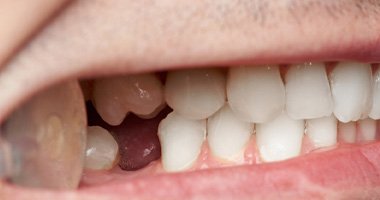
According to the American College of Prosthodontists , the most common reasons why people lose their teeth include tooth decay, gum disease, and trauma. When you are missing teeth, here are some of the negative consequences you can experience:
- Lower Confidence: When you have gaps in your smile, you may feel less confident about your appearance. This can affect both your professional and personal lives.
- Difficulty Speaking: Without all of your teeth in your mouth, it can be difficult to express yourself clearly. This can make it much more challenging for people to understand you.
- Facial Sagging: When you are missing teeth, the muscles in your face aren’t being supported. This can make your cheeks appear hollowed out and your lips can become wrinkled prematurely. Both of these characteristics will make you appear older.
- Difficulty Eating: Chewing your food thoroughly is important for proper digestion and absorbing the vitamins and minerals you need.
What Qualifies You for Dentures?

If you have experienced significant tooth loss or extensive tooth decay, dentures are likely a good option for you. However, it is important that you have sufficient healthy gum tissue and jawbone. People who get dentures must be committed to an excellent oral hygiene routine and willing to properly care for their prostheses.
The number of teeth that you need to replace will determine which type of denture is ideal for you. Dentures tend to be more affordable than other tooth replacement options, making them a great option for people who are unable to invest a lot of money into their smile.
Alternative Tooth-Replacement Options
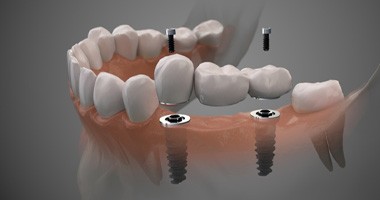
If dentures aren’t your fit, there are other tooth replacement options out there:
- Dental Bridges: Dental bridges are ideal for patients who are only missing one or a few teeth. They require healthy teeth surrounding the missing tooth/teeth to support the bridge.
- Dental Implants: Since a titanium post is inserted into the jawbone, patients must have a solid bone structure. This option is more costly than traditional dentures but lasts much longer.
Types of Dentures
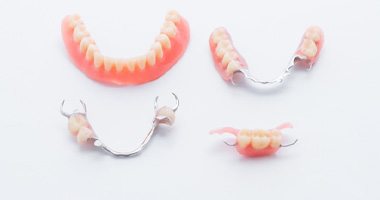
There are a number of different types of dentures. During your consultation, our team will assess your circumstances and learn about your budget before we help you make a decision about how to move forward. Depending on what we discover, we may recommend that you get partial dentures, full dentures, or implant dentures.
Partial Dentures
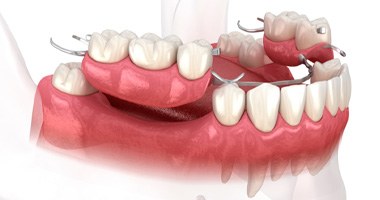
Partial dentures fit into place between remaining natural teeth, much like a missing puzzle piece. They are held in place via small metal or acrylic attachments. They are often the best choice for patients whose remaining natural teeth are still in fairly good shape.
Full Dentures
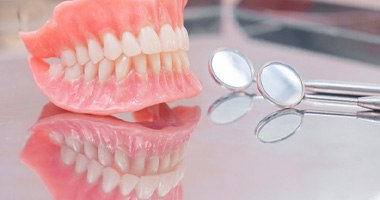
As their name implies, full denture replace an entire arch of missing teeth. They are custom-designed to work with the unique gum shape of each patient. Their base is usually made of acrylic, and their teeth are often constructed out of acrylic or porcelain. In most cases, they stay secure in the mouth via natural suction. However, in some instances, adhesive is also necessary.
Implant Dentures
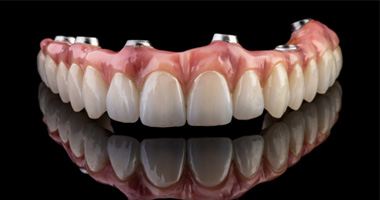
Implant dentures are held in place with the help of prosthetic tooth roots, which get surgically inserted into the jawbone. After the implants have a chance to bond with the surrounding tissue, they are able to support prosthetic teeth. Implant dentures tend to last much longer and provide a stronger bite force than their conventional counterparts.
How Dentures are Made

To truly appreciate just how much dentures can change your life, it’s important to understand how they’re hand-crafted to specifically meet your individual needs. From the moment we capture your dental impression to when our dental laboratory sculpts and brings your replacement teeth to life, each step of this process is done with you in mind.
What are Dentures Made From?

Multiple types of materials are used to create full and partial dentures. Learn more about each component that your prosthetic is comprised of below:
- The Denture Base: The foundation of your denture, whether you need a full or partial, will either be made from metal, nylon, resin, or acrylic. If crafted from acrylic, they will be custom-shaded to match the color of your existing gum tissue, allowing them to blend in with your natural smile.
- Replacement Teeth: Your prosthetic comes to life with porcelain, ceramic, or resin replacement teeth that are sculpted and texturized to look virtually indistinguishable from your natural teeth. Porcelain is a popular choice, as it has the ability to mimic the natural appearance of tooth enamel by reflecting light.
The Denture Creation Process

The denture creation process is extensive and will be completed by one of the trusted dental laboratories our practice partners with. Once we’ve captured impressions of your jaw and mouth, we’ll be able to create wax or plastic models that allow us to test the fit and shape of your new prosthetic. Then, we can confidently send them off to the technician to craft your denture.
The technician will carve your dentures from wax, creating a model that can be molded out of plaster and melted away with hot water. Then, they’ll be able to fill the mold with acrylic and any other materials that will be used to create your permanent prosthetic. Once this has been done, they’ll carefully remove the denture from the mold and clean it in an ultrasonic blast before trimming excess acrylic and adding finishing details.
Once your dentures have been crafted to our team’s specifications, the technician will send your prosthetic back to our office so we can make sure they fit properly and that your bite is even.
Adjusting to Your New Dentures

It will take about a month to adjust to the way your dentures feel when you eat and speak. Over that timeframe, it’s important to follow your dentist’s care instructions and continue practicing speaking and chewing with your new prosthetic. If you have any questions or need assistance during this time, please don’t hesitate to reach out to our wonderful team at The Smilist Dental Medford.
The Benefits of Dentures

After living with missing teeth, getting dentures can feel like a breath of fresh air, allowing you to regain both the function and appearance of your smile. In addition to boosted confidence and a natural look and feel, dentures offer a host of benefits that can impact your day-to-day life, from being able to eat a more varied diet to leaving a better first impression on people. We invite you to browse the advantages of restoring missing teeth below, and if you want to experience the countless pros of this tried-and-true treatment, give our office a call to schedule a consultation!
Psychological Benefits

Living with gaps in your smile can take a serious toll on your confidence and quality of life. In many cases, it results in patients being at a higher risk of social anxiety, depression, denial, and general frustration due to your smile operating differently than it once did. In some cases, these psychological impacts can cause patients to go out less often as well as spend less time with friends and family, making them feel isolated. Dentures can help you regain your sense of confidence by restoring your smile to its fullest functionality and appearance.
Clearer Enunciation

Spaces between teeth can cause you to develop speech impediments like lisps as well as accidentally slurring words. Although you’ll go through an adjustment period getting used to speaking with your dentures, you’ll be able to improve your pronunciation of words, eliminating embarrassing moments while conversing with others.
Improved Nutrition

Having a complete set of pearly whites can help you chew your food better and improve your body’s ability to intake key vitamins and minerals from what you eat. It can also increase the variety in your diet by making it easier to digest and eat foods that are less soft, like meats. This can lead to a more balanced overall diet to decrease your chances of vitamin deficiency as a result of only being able to eat certain foods.
Preservation of Oral Health

When gaps are left between teeth, with time, those surrounding teeth will begin to shift to fill in the spaces, causing misalignment and increasing your risk of developing other oral health problems, like cavities and further tooth loss. By filling these gaps with a partial denture, you can maintain your dental alignment, all while improving the overall health of your grin.
Expanded Opportunities

Your smile is often the first impression that you have on others, and when you feel too self-conscious about letting it show, it can lead to poorer outcomes in important situations like job interviews. With a smile that you feel proud of, you can increase your chances of landing a career-defining position or even a second date with someone you really like!
Dentures Aftercare

While dentures are indeed reliable for restoring your smile's appearance and function, it's important not to neglect oral care. Dentures need regular maintenance and a healthy mouth to function optimally. Neglecting these aspects could lead to long-term oral problems. At The Smilist, we're here to assist you. Read on for essential tips on caring for your dentures, or feel free to give us a call for further details!
Removable Dentures

Remove After Eating
Following each meal, take out your dentures and give them a thorough rinse. This practice prevents the accumulation of food particles and plaque. Avoid using hot water, as it can distort the denture material, leading to fitting issues.
Clean Your Restoration
To clean your dentures, first, you need to take them out. Use a soft-bristled toothbrush with a small amount of unscented hand soap, mild dish soap, or denture cleanser to gently brush them. Avoid using regular toothpaste, as it can be too abrasive for dentures.
If you won't be wearing them immediately, soak them in water or a denture-cleansing solution to prevent drying and shape distortion. Always rinse your dentures thoroughly before putting them back in your mouth, as these cleaning materials are not meant to be ingested.
Keep Your Dentures Safe
When cleaning your dentures, lay a towel beneath them to catch any accidental drops, minimizing the risk of damage. Additionally, ensure your dentures are kept out of the reach of small children and pets to prevent any potential mishaps.
Remove When You Sleep
Remove your dentures before bedtime. Wearing dentures can limit gum circulation, potentially causing soft-tissue irritation. Sleeping with dentures has been linked to a heightened risk of pneumonia, along with increased plaque on gums and tongue. Store your dentures in a denture-soaking solution overnight. Allowing them to dry out may result in permanent shape distortion.
Notice Changes
Stay vigilant for any changes and promptly inform your dentist. This encompasses monitoring for mouth sores, gum irritation, or potential signs of infection.
If your dentures sustain damage, refrain from attempting to fix them independently. Contact your dentist for professional repair to avoid inadvertently causing more harm.
Should you notice signs of improper fit, such as shifting or clicking, inform us right away. Your restoration may require relining or replacement to ensure optimal comfort and functionality.
All-on-4 Dentures
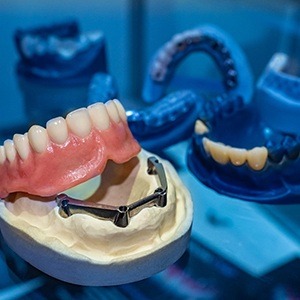
All-on-4 dentures are securely anchored to the mouth via four dental implants surgically embedded in the jawbone. Since they're not removable, maintenance mirrors that of natural teeth—brush twice daily, floss, and use alcohol-free mouthwash. Remember to also keep up with regular checkups and cleanings to ensure the health of your prosthetics and implants remains optimal. This routine care guarantees a confident smile for years to come!
Dentures FAQs
 At The Smilist Dental Medford, Dr. Rosenfeld believes in providing patients with the right solutions when it comes to replacing missing teeth. If you recently learned you need dentures, you likely have many questions you’d like to ask your dentist. Dr. Rosenfeld and his team want you to have all the information you need to help you make the right decision for your dental needs, which is why you will find some frequently asked questions below. After reviewing the following questions, we invite you to contact our team if you have any additional concerns or would like to schedule an appointment.
At The Smilist Dental Medford, Dr. Rosenfeld believes in providing patients with the right solutions when it comes to replacing missing teeth. If you recently learned you need dentures, you likely have many questions you’d like to ask your dentist. Dr. Rosenfeld and his team want you to have all the information you need to help you make the right decision for your dental needs, which is why you will find some frequently asked questions below. After reviewing the following questions, we invite you to contact our team if you have any additional concerns or would like to schedule an appointment.
Will it be difficult to adjust to new dentures?
It should come as no surprise that you will experience an adjustment phase while wearing dentures. From those who are new to these types of fixtures, learning to eat and speak without worrying about slippage or how you sound can take time. Fortunately, there are some tips you can use to make the process easier and less stressful, including:
- Eating soft foods in the beginning and gradually incorporating harder foods as you become more comfortable eating with your dentures. In the beginning, your mouth may feel a bit sore as it tries to adjust, so eating softer foods can help minimize discomfort. Should you feel it becoming loose, simply swallow. It will help to push your denture back into place.
- Try talking in front of a mirror to see how your mouth moves as you pronounce certain words. You may have a slight lisp when you first begin wearing dentures; however, as you practice and slow down your speech, you will notice it will dissipate over time. If you struggle with certain words, continue practicing saying them. Before you know, you will begin speaking with greater clarity.
Why can’t I sleep in my dentures?
It is advised that you avoid sleeping in your dentures for a few reasons:
- Your gums and jawbone need to breathe. When wearing your dentures throughout the day, you will notice that it feels quite nice to be able to take them out at the end of the day. It gives these areas of your mouth a chance to relax and be void of the continued pressure placed on them all day.
- Sleeping in your dentures can cause them to become brittle, making them more likely to break. Soaking them helps to not only clean away debris and particles that gather on them, but it also helps to keep them moist.
How long will my dentures last before they need to be replaced?
The lifespan of your dentures largely depends on how well you take care of them. On average, most denture-wearers can expect to wear them for 5-8 years before requiring a replacement; however, if you are careful and diligent in maintaining your dentures on a daily basis, you may be able to go a bit longer.
However, some things are out of your control, such as age and facial changes. It is natural that over time, your face and jaw will begin to change. As a result, your denture may no longer fit as comfortably. If this happens, you can see us for an adjustment. We may be able to reline your denture to fit properly in your mouth.
Do I still need to see a dentist even if I wear full dentures?
Absolutely! Even if all your teeth have been replaced with dentures, it is still necessary to see us for regular checkups and cleanings. These visits will allow our team to examine your restorations and check for any signs of breakage, fractures, or damage. It will also give us a better idea of any changes occurring within your jawbone or facial structure. Since gum disease is also a possible problem, we can work to eliminate the chances of developing this common issue and better protect your oral health.

